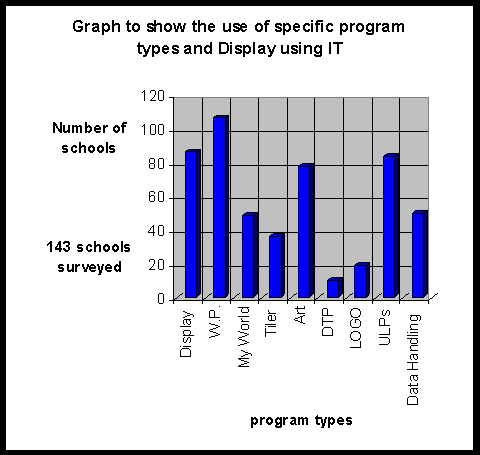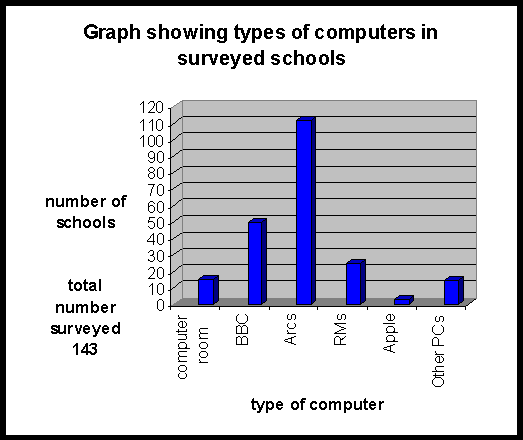Cliff Warner
Lecturer in the School of Education at Derby University
Background:
Computers were first introduced into primary schools in this locality in 1981. These were BBC model B machines and programs loaded by cassette tape player. This was a tedious and often a frustratingly unsuccessful process. Within months schools were provide with new 'disc-drives' with 5 3/4" floppy discs. Loading programs became very easy and the use of computers became common place with most teachers, but using a very limited range of mainly 'drill and practise' type programs. BBC Masters computers arrived during 1984 and this meant an almost identical computer, but with a larger RAM memory, now allowed a wider range of enhanced software to be used in schools. Locally, schools started to use LOGO and the original PenDown.
In 1988 schools began to purchase new Acorn machines, firstly the Archimedes, later on A3000, A4000/ 5000, until in 1994 RISC PCs and A7000s, both with CD-ROM drives, became available and the latter, at present, being the most popular machine purchased throughout Britain for educational usage.
Unlike other curriculum areas, ICT is not just a subject in its own right but also a tool used to enhance and support the whole curriculum. In view of the fact that ICT is a relatively recent addition to the curriculum, there exists less expertise amongst teachers than is the case for the longer established subjects. This can also point to there being potentially less confidence in the teaching and provision of ICT in some schools.
There has been over the last sixteen years in schools 'waves' of enthusiasm for ICT. Often coinciding with the launch of 'new technology'. The introduction of the National Curriculum in 1988 raised awareness of the concepts of Information Technology, but little more was being done in many schools than had been achieved in 1985. Some schools have doggedly kept up their ICT development in line with the National Curriculum requirements, but sadly, our students' survey tends to suggest that this is not widely evident. Perhaps we already suspected this to be the case!
B.Ed Year 1 IT Survey.
In conducting this survey we are attempting to ascertain to what extent the Statutory Orders for Information Technology (DFE (1995)), are being implemented in local schools. These indications, evidenced in our survey, will be used to inform our planning of future In-Service courses offered to local schools by the IT(Education) staff at the University of Derby.
The survey was conducted by B. Ed Year 1 students on visiting their placement schools for School Experience. The observations made by the students formed part of an assignment in Educational Learning skills and Information Technology. A total of 143 students visited the local schools and they were given strict instructions to OBSERVE ,rather than interrogate, in order to compile the information. No individual school has been identified and no judgement or comment is therefore made about any individual school.
- at Key stage 1:
'Pupils should be taught to use equipment and software confidently and purposefully to communicate and handle information, and to support their problem solving, recording and expressive work.' DFE(1995)
- at Key stage 2:
'Pupils should be taught to extend the range of IT tools that they use for communication, investigate and control; become discerning in their use of IT; select information, sources and media for their suitability for purpose; and assess the value of IT in their working practices.' DFE(1995).
In order to encourage a wider use of relevant IT usage in our local schools and so help our students to develop even more 'comfort' in the introduction of ALL the strands of IT competence, we perceive a need to provide a wide range of in-service opportunities for serving and newly qualified members of the profession. We see these as ranging from quite basic courses to the less popular areas of Control and Modelling. These would complement any training initiatives being used by Derbyshire and our neighbouring LEAs.
Some evidence disclosed by the survey, we understand, may be duplicated because all of the schools remained anonymous and we are aware that one or two schools will have more than one student placed with them. This may give rise to very small variations in the percentages quoted.
Some causes for concern in the use of IT which have been highlighted by the survey:
- much 'drill and practise' work is still being used with programs such as Granny's Garden, Bottles, Mickey and other programs similar to the original Anita Straker series circa I 984.This was evidenced in 59% of the schools. These are referred to as ULPs (useful little programs) in the graph to show the use of specific programs.
- word processing programs, being the main usage of IT in schools (75%), are being used to produce 'best copy' of stories, topic reports etc first written by hand on paper instead of original/creative writing tool, hence WP skills of drafting and editing are not being taught.
- Despite a very high incidence of printers in schools (98%), surprisingly a lower than expected amount of display was seen to be recorded, only 61% had any form of IT in their school displays. Many schools had a few printers available, either colour and/or black and white, but few had one connected to every computer. There appeared to be far fewer printers in most schools than the total number of computers. A few schools did not have the correct 'printer drivers' to enable the printers to be used and there was one school which had at least one printer which they were unable to configure or connect to the computer.
- framework programs such as My World are being used in the 'as is' state rather than creating screens to address specific teaching points and children's needs. 34% are recorded as using My World at sometime.

- few instances of modelling other than LOGO and adventure games were found, but of the 13% which showed evidence of LOGO type programs, half of these were in schools whose main type of computer was RM Nimbus. This suggests that only a small proportion (3%) of 'Acorn-main' schools actively use turtle graphics programs!
- only 35% of the schools had any evidence that information handling packages were used at all and these tended to be in the schools whose main computer type was Acorn.
- alternative input devices eg. CLICKER or concept keyboards appear to be under used, especially with special needs groups.
- no evidence of sensors or control devices was recorded.
- despite the range of CD-ROMS available only the encyclopaedia specific ones seem to be used regularly.
- There was evidence of undirected use of a computer at the end of sessions to 'entertain' children who had finished all their work!
- 10% of the schools had a designated and time-tabled computer room/area; it may be therefore assumed that the majority of schools use their IT equipment within the classroom environment, with small groups on perhaps one or two computers.

ln all the schools we surveyed the use of the Acorn series of computers was by far the most prevalent. The Derbyshire Authority and Derby City support both Acorn and PC use, but it would seem that the majority of educational software is available in the Acorn format. Some programs exclusively. Of the schools which we found to be currently using Acorns 24% of these machines had CD-Rom drives.
Following recent Ofsted inspections several local primary schools have acknowledged the advice that their IT provision within the framework of the National Curriculum is in need of some additional attention. To an extent this view is supported by the finding of our survey. It is clear that to implement some of the features of the Orders, Monitoring & Control for example, extra equipment may be needed and this of course has ramifications for the overall budgetary considerations within the provision of the Curriculum.
Update
During the past year, further information has been sought with regard to the number of schools that have a 'connection' to the Internet. This is a constantly changing situation, almost on a weekly basis, but during Autumn term 1999 our observed schools, showed that all the connections were completed. Although in some case the schools reported having all the 'equipment' and connections but not, as yet, having the 'kit' configured for Internet usage. Of all the schools, 36% have received training on their use of the Internet; 19% said they had begun to use the web with the children. Of the ones which are at the moment connected I 2% have been allocated an email address and are using it to some extent.
References:
DFE(1 995) - Key Stages I and 2 of the National Curriculum HMSO London